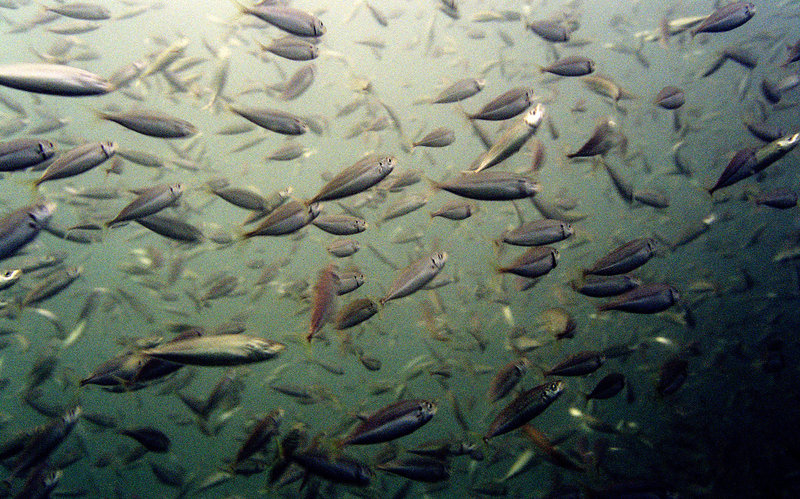WASHINGTON — The Atlantic menhaden is one of those big things that come in small packages. It’s a pipsqueak of a fish, but it feeds some of the most important fish in the ocean. If it vanished, marine biologists say, the ecosystems of the Atlantic and the Chesapeake Bay could come crashing down.
As the population of this once abundant fish dwindles in dramatic fashion, that theory might be put to a test. Humans don’t eat the oily and bony menhaden, but it’s caught by the metric ton each year, ground into meal and fed to farm fish and livestock.
Environmentalists fear that the commercial catch takes food from striped bass, bluefish, swordfish, king mackerel, tuna, loons and eagles that rely on menhaden.
The reduction of menhaden, widely dubbed “the most important fish in the ocean,” is such a concern that the Atlantic States Marine Fisheries Commission is scheduled to meet today to consider whether its harvest for commercial products and sport-fishing bait should be significantly lowered for the first time in years.
“Menhaden is ecologically critical to the marine ecosystem along the East Coast,” said Bill Goldsborough, fisheries director for the Chesapeake Bay Foundation.
In addition to feeding saltwater fish that Americans love to fish and eat, tiny menhaden feed on phytoplankton that contribute to algae blooms and oxygen-depleted “dead zones.” A dead zone currently in the Chesapeake is on track to be the largest ever, Maryland and Virginia state biologists have said.
At the meeting in Alexandria, Va., commissioners will be guided by an assessment that says menhaden have not been overfished, spokeswoman Tina Berger said. But the commissioners are concerned about other data that show the number of young fish entering the population is falling, and that the number of eggs that sustain menhaden has started to dip below a standard they set.
The commissioners are expected to consider a proposal to increase the number of young menhaden, as well as egg production, possibly by reducing the menhaden catch, experts say.
The meeting will be closely watched by Omega Protein, which last year fished about 160,000 metric tons of menhaden in Atlantic coastal waters – 80 percent of the total catch.
The fisheries commission assessments of the menhaden stock show a dramatic decline: Fifty years ago, the abundance of menhaden a year old or less was nearly 90 billion. Twenty-five years ago, it was 70 billion.
Now, after continued fishing that environmentalists say is loosely regulated, only 18 billion menhaden of that age remain.
Omega Protein spokesman Ben Landry said factors such as poor water quality have reduced the fish.
Nevertheless, 13 coastal states from Maine to Florida under the commission’s jurisdiction have banned Omega Protein from harvesting menhaden in state waters with its huge ships and large purse seine nets.
Only Virginia allows the company full access to its waters in the Atlantic and the Chesapeake Bay. North Carolina gives very limited access, according to Landry and the Coastal Conservation Association that monitors the menhaden harvest.
Virginia also stands alone in managing its menhaden fishery from an unusual place, the state General Assembly.
Others rely on specialists at environmental agencies such as Maryland’s Department of Natural Resources and New Jersey’s Division of Fish, Game and Wildlife.
The Virginia Marine Resources Commission declined to comment on why state politicians gave it control over all other fish species but held on to the menhaden.
“It’s political,” said John Bello, who sits on the board of directors for the Coastal Conservation Association. The association has unsuccessfully pushed legislation to transfer management of the menhaden fishery to the VMRC for 10 years.
Copy the Story Link
Send questions/comments to the editors.



Success. Please wait for the page to reload. If the page does not reload within 5 seconds, please refresh the page.
Enter your email and password to access comments.
Hi, to comment on stories you must . This profile is in addition to your subscription and website login.
Already have a commenting profile? .
Invalid username/password.
Please check your email to confirm and complete your registration.
Only subscribers are eligible to post comments. Please subscribe or login first for digital access. Here’s why.
Use the form below to reset your password. When you've submitted your account email, we will send an email with a reset code.